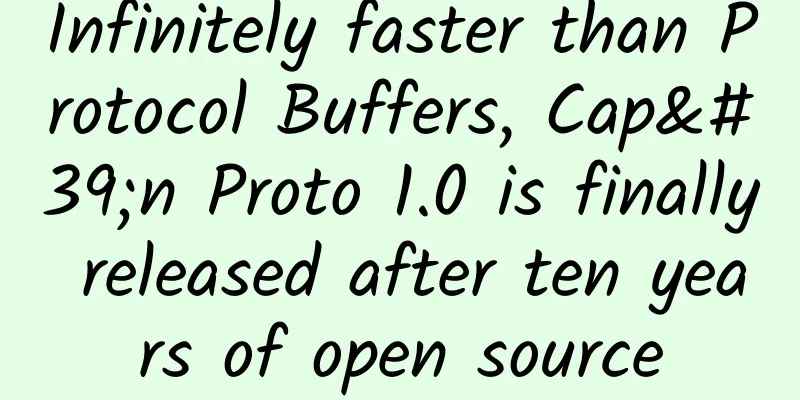Infinitely faster than Protocol Buffers, Cap'n Proto 1.0 is finally released after ten years of open source

|
Cap'n Proto is an extremely fast data exchange format and capability-based RPC system, which was released as open source in April 2013. Today, Cap'n Proto 1.0 is finally released , which is a long-term support version. The author of the Cap'n Proto project is Kenton Varda, the main developer of Protocol Buffers version 2. He said that Cap'n Proto is the result of years of developing Protobufs, listening to user feedback, and drawing on experience and reflection. He has now left Google, so "Cap'n Proto is not affiliated with Google and has never been affiliated with Google." Benchmark results show that Cap'n Proto is infinitely faster than Protocol Buffers. Some highlights of the new version since the previous version v0.10 include:
After the release of version 1.0, the work on version 2.0 was also put on the agenda. According to the plan, v2.0 aims to make some changes to Cap'n Proto's C++ API and its supporting KJ C++ toolkit library; as well as make some comprehensive backwards-compatible changes to fix some issues and improve the experience of developers in the team. Some current ideas include:
It is worth noting that there are currently no plans to make any backwards-incompatible changes to the serialization format or the RPC protocol. The changes in question only affect the C++ API. Applications written in other languages are completely unaffected by all this. The official 2.0 version will not be released in the short term, and it may take a few years. |
Recommend
How to create a new financing model for product-based IT
As technology departments move away from traditio...
Weekend news! Under the US ban, Huawei has won over another major European country and become a core 5G supplier!
Because of 5G technology, the United States has s...
Qianxinan Prefecture: Green "optical" network, a new style of government office
On a normal working day, sunlight shines through ...
DogYun New Year's Day promotion: 30% off on Elastic Cloud, 20% off on Classic Cloud, 100 yuan off per month for dedicated servers, 10 yuan free for every 100 yuan recharged
DogYun (狗云) has launched a promotional event duri...
To ensure the healthy development of 5G, we must start with the standardization of business data release
On the eve of the Spring Festival, the Ministry o...
Are the operators wronged when being questioned about “4G speed reduction and 5G hibernation”?
Recently, a piece of news about "Luoyang Uni...
If 4G construction is "building roads", 5G is actually "building cities"...
"Now that I'm using 5G, I don't thin...
[6.18] TmhHost 30% off on all VPS, Japan/Hong Kong/Los Angeles CN2 GIA/AS9929 monthly payment starting from 21 yuan
This should be the first merchant to start the 61...
5 Common SD-WAN Challenges and How to Address Them
Software-defined WAN is a feature-rich technology...
Let's talk about HTTP/3, QUIC, how do they work?
Why do we need HTTP/3? One important reason is to...
VULTR: KVM in 25 data centers around the world starting at $2.5 per month (supports hourly billing), $50 for new users
It has been more than 6 months since I last share...
The number of domestic 4G users has reached 1.29 billion, with a penetration rate of 80.7%.
Yesterday, the Ministry of Industry and Informati...
CrownCloud: 2GB VPS in Los Angeles/Germany/Netherlands/Atlanta data centers starting at $5 per month
CrownCloud is a long-established foreign VPS host...
2.4G or 5G? Do you know the difference between Wi-Fi frequency bands?
Overview The 2.4G and 5G mentioned in the title r...
How to integrate network management tools
In the process of curbing the proliferation of ne...









